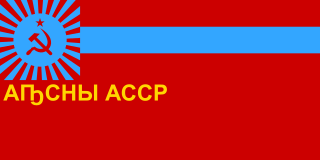
Raul Jumkovich Khajimba is the current President of Abkhazia, having been elected in 2014 after the May Revolution. He was also Chairman of the Forum for the National Unity of Abkhazia from 2010–2015. Khajimba previously held the offices of Vice President (2005–2009), Prime Minister (2003–2004) and Defence Minister (2002–2003). He unsuccessfully ran for President in 2004, 2009 and 2011.
Anri Mikhail-ipa Jergenia has been one of the leading politicians of the internationally unrecognised Republic of Abkhazia since it achieved de facto independence from Georgia. From June 2001 to November 2002 he was the republic's Prime Minister and for a time Jergenia looked to be the favourite to succeed Abkhazia's first president Vladislav Ardzinba.
Konstantin Ozgan was a leading politician in Abkhazia serving i.a. as Supreme Soviet Chairman, Foreign Minister, Economy Minister, First Vice Premier and as Chairman of the Council of Elders of Abkhazia
Politics in Abkhazia is dominated by its conflict with Georgia. Abkhazia became de facto independent from Georgia after the 1992–1993 war, but its de jure independence has only been recognised by a few other countries. Abkhazia is a presidential representative democratic republic with a multi-party system, wherein the President is both head of state and head of government. Executive power is exercised by the government of the Republic of Abkhazia. Legislative power is vested in both the government and the People's Assembly of Abkhazia.

The Abkhaz–Georgian conflict involves ethnic conflict between Georgians and the Abkhaz people in Abkhazia, a de facto independent, partially recognized republic. In a broader sense, one can view the Georgian–Abkhaz conflict as part of a geopolitical conflict in the Caucasus region, intensified at the end of the 20th century with the dissolution of the Soviet Union in 1991.

Aleksandr Ankvab is an Abkhaz politician and businessman who was President of Abkhazia from May 29, 2011, until his resignation on June 1, 2014. Under President Sergei Bagapsh, he previously served as Prime Minister from 2005 to 2010 and Vice-President from 2010 to 2011.

The Kingdom of Abkhazia, also known as Abasgia or Egrisi-Abkhazia, was a medieval feudal state in the Caucasus which lasted from the 780s until being united, through dynastic succession, with the Kingdom of Georgia in 1008. In the early years of the 10th century, Kingdom of Abkhazia stretched, according to Byzantine sources, along the Black Sea coast three hundred Greek miles, from the frontiers of the thema of Chaldia to the mouth of the river Nicopsis, with the Caucasus behind it.

This article refers to the history of Abkhazia from its pre-historic settlement by the lower-paleolithic hunter-gathers during the mesolithic and neolithic periods to the post-1992-1993 war situation.
Parliamentary elections were held in Abkhazia on 4 March 2007, with a second round in seventeen constituencies on 18 March.

The War in Abkhazia from 1992 to 1993 was fought between Georgian government forces for the most part, and Abkhaz separatist forces, Soviet Russian government armed forces and North Caucasian militants. Ethnic Georgians who lived in Abkhazia fought largely on the side of Georgian government forces. Ethnic Armenians and Russians within Abkhazia's population largely supported the Abkhazians, and many fought on their side. The separatists received support from thousands of North Caucasus and Cossack militants and from the Russian Federation forces stationed in and near Abkhazia.
The Sukhumi riot was a riot in Sukhumi, Abkhaz Autonomous Soviet Socialist Republic, Georgian Soviet Socialist Republic, Soviet Union, in July 1989, triggered by an increasing inter-ethnic tensions between the Abkhaz and Georgian communities and followed by several days of street fighting and civil unrest in Sukhumi and throughout Abkhazia.
Parliamentary elections were held in Abkhazia on 2 March 2002 to elect the third convocation of the People's Assembly. The elections had originally been scheduled for 24 November 2001, but had to be postponed due to the October 2001 Chechen incursion into the lower Kodori Valley. Candidates supporting President Vladislav Ardzinba won all 35 seats.
This article is about the demographic features of the population of Abkhazia, including population density, ethnicity, education level, health, socioeconomic status, religious affiliations and other aspects of the population.

On 12 December 2009, Abkhazia held its fourth Presidential election since the post of President of the Autonomous Republic of Abkhazia was created in 1994. The election was won by incumbent president Sergei Bagapsh in the first round with 61% of the votes, thus gaining a second term in office. He was inaugurated on 12 February 2010. Bagapsh competed against four opposition candidates: former Vice President and Prime Minister Raul Khajimba, who came second behind Bagapsh in the 2004 Presidential election, and newcomers Beslan Butba, Zaur Ardzinba and Vitali Bganba. Khajimba had stated that he, Ardzinba and Butba would support each other should one of them reach the second round of the election.
The elections for the 5th convocation of the People's Assembly of Abkhazia were held in two rounds on 10 and 24 March 2012.
This is an alphabetical list of Abkhazia-related articles.
Parliamentary elections were held in Abkhazia between October and December 1991.
Elections to the People's Council were held in Abkhazia on 13 February 1919, alongside parliamentary elections in Georgia.










